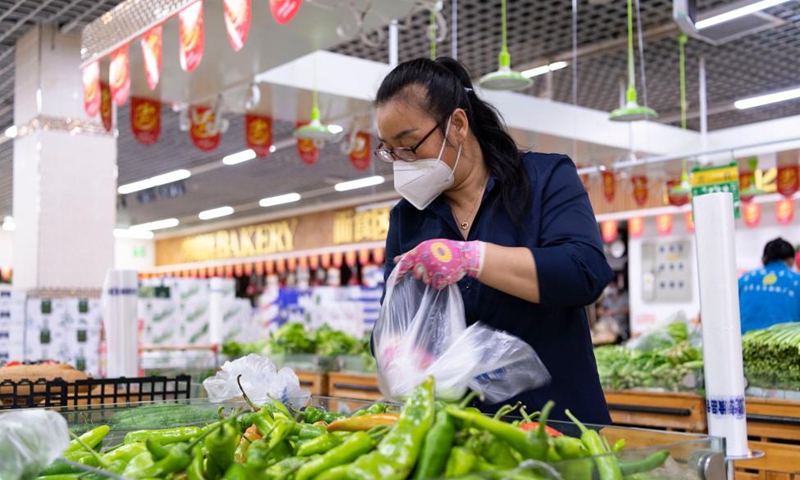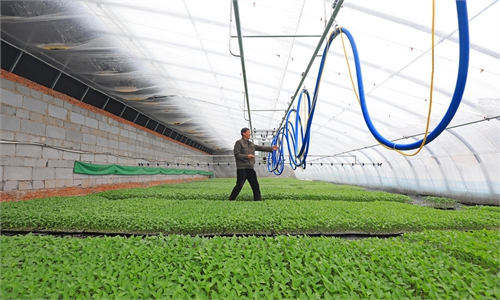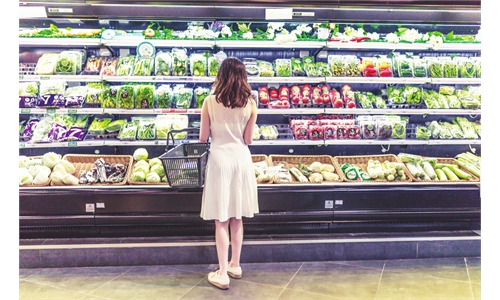
A supermarket employee selects vegetables ordered online by residents under close-off management in Bayan County of Harbin, northeast China's Heilongjiang Province, Sept. 27, 2021. Photo:Xinhua
Major Chinese food companies are hiking prices, in some cases by up to 15 percent, due to a confluence of global factors that disrupted supplies and pushed up costs, including US monetary policies, the COVID-19 pandemic and high oil prices.The price hikes began to draw attention in October and continued into November. But analysts noted that despite rising prices for certain products in the rest of the year, overall consumer inflation in China will remain stable given stable domestic supplies, government efforts and low port prices.
Jiangsu Hengshun Vinegar Industry, China's biggest vinegar manufacturer, based in East China's Jiangsu Province, said on Tuesday that the prices of some of its products will rise by 5-15 percent on November 20. But due to rising costs and other factors, profits won't necessarily increase, according to the company's statement.
On Tuesday, Tengxin Foods said it would raise prices by 3-10 percent, citing continuous increases in the costs of raw materials, labor, energy and logistics.
Responding to these announcements, shares of food processing companies listed in the A-share market rose further on Wednesday after gaining on Tuesday.
The food price hikes reflect a global chain reaction that had been expected, experts said.
"In the context of soaring oil prices, China's food price increases were a matter of time... purely from the perspective of global cost transmission," Tian Yun, an economist based in Beijing, told the Global Times on Wednesday.
Although Brent crude oil futures fell 1.2 percent to $83.69 a barrel on Wednesday, they remained above $80, which is a three-year high, media reports said.
Tian said prices will continue to rise for the rest of the year but in a steady and controllable way. "Now we are looking at the US, because the US market determines the overall trend of oil prices, which are the final driver of all commodities, and if the US does not raise interest rates this month, [global] inflation may continue," Tian said.
Although the US government has said it would retreat from its loose monetary policy, it might not happen until the first half of next year. In that case, prices of bulk commodities will not drop significantly in the fourth quarter of this year, Li Changan, professor of the Academy of China Open Economy Studies at the University of International Business and Economics, told the Global Times on Wednesday.
But there's no need to be too worried about higher food prices in China or the possible impact on domestic consumption, given the nation's adequate inventories, secure and expanded supplies, and policy support.
Domestic pork prices, which are the major driver of food prices overall, fell from a high of 93.86 yuan ($14.67) per kilogram in March to 22.45 yuan in the second week of October, declining for 29 consecutive weeks.
As a result, the CPI rose 0.7 percent year-on-year in September, unchanged from the previous month, and the year-on-year growth rate remained below 1 percent, the National Bureau of Statistics said. That was a very low level, compared with the 5.4 percent increase in overall consumer prices in September in the US.
This year's price trend is being driven mainly by the sharp drop in pork prices, which has depressed the inflation level overall, Tian said.
In addition, China has imported a large volume of food, reduced exports, and prioritized domestic supply, which all helped to secure supplies and stabilize prices.
"As long as the meat price does not rise, the impact will be small," Li said, predicting that the CPI may reach 2 percent in the fourth quarter, but will not exceed 3 percent for the whole year.


